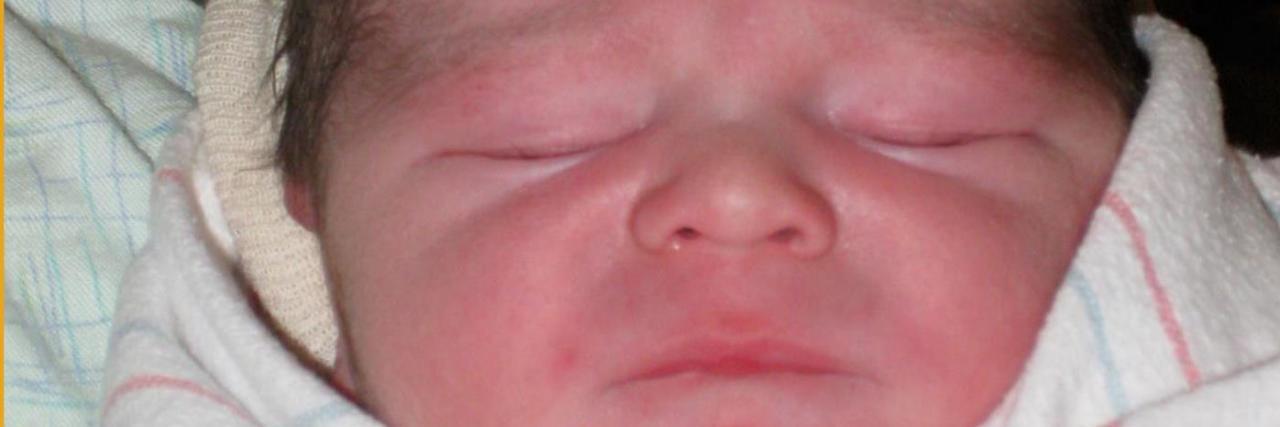I first learned about primary ciliary dyskinesia (PCD) 12 hours after my son was born. My son, Conor, was born a full-term, 9 pound, 4 ounce “healthy” baby boy. After staying with us the first night, Conor couldn’t seem to get rid of a tiny bit of congestion which led to a chest X-ray and the realization that his internal organs were completely reversed, a mirror image left to right, a condition called situs inversus totalis. It seems like science fiction, right?
After the doctors told us that they had personally never seen a case of “situs” before, they informed us that many people with situs inversus have no health problems when the condition is isolated. But, when it occurs in association with a genetic condition like PCD, there are “other concerns.” From that point, we heard a number of comments from the doctors that were concerning – if not alarming – in light of what would happen a few hours later:
“Even if he has it, you won’t need to worry about it until later in his life. It doesn’t manifest itself until later.”
“Donny Osmond has situs inversus totalis – and he’s just fine!”
“Don’t worry – he’ll just a have a snottier nose than the other kids. All kids have runny noses.”
Conor passed away the next day, shocking every doctor and nurse involved in his care. His lungs collapsed causing his heart to shut down. They couldn’t save him.
The doctors said that they had never seen or heard of anything like it – a perfectly healthy, robust baby boy rapidly deteriorating to the point where he couldn’t be saved – and couldn’t tell us what happened.
During the hours before he passed, my husband and I were frantically trying to find any information on this “thing called PCD” and what it means to have reversed organs, but information was few and far between. What we were able to find didn’t quite ‘match’ what we were hearing from the doctors. I remember my husband saying, “Oh my God – this could be like cystic fibrosis.” It was a very cold, isolating yet very confusing feeling to realize that these very experienced doctors in a state-of-the-art hospital (in a major U.S. city) might not know what we are dealing with. Unfortunately, we were right.
“Do you want an autopsy?” they asked. “Yes. And I want him tested for PCD.” I replied. “It wouldn’t be seen as a “cause of death,” the neonatologist responded, but agreed to do it because I was so serious about it. The autopsy came back ‘acute pneumonia’ which again shocked the doctors who had taken multiple ‘clear’ X-rays of his chest and were unable to grow bacteria on tracheal samples when he was alive. They had also given him two antibiotics that would have addressed a supposed 90% of any infections out there.
Ultimately, we can get our minds around the cause of death. However, if your cilia don’t work, they don’t work from day one. He went into a fight with one arm swinging and he lost. He couldn’t fight the infection like a ‘normal’ healthy baby. We aren’t doctors and have no medical training, but that made sense to us. And, the neonatologist who met with me to discuss his case agreed with me.
Weeks later, he tested positive (post-mortem) for PCD.
I don’t want any parents to have to lose a child like this. I think Conor’s situation is rare, and I’m not sure he could have been saved – maybe he had a more severe form if it, we don’t know. Or maybe the pneumonia he contracted would have been too much for any child? Or maybe if he had gotten through the first couple of days, he’d be here right now slugging away with his daily treatments? But we don’t really know, and never will.
What I do know is that we can’t track what we don’t measure. Conor is not the first case on record in the world (yes, in the world), so it’s clear that he’s not the first, and certainly not the last. It’s also clear that oftentimes we as parents, patients and families have to go with our gut and have confidence in what we know to be true – regardless of the evidence base that exists.
Conor passed almost 10 years ago now. His “evidence” of having existed has influenced how we can talk about PCD and its impact – and hopefully with other voices impacted by PCD, we are more informed and perhaps even a baby step closer to a world without PCD. Thank you, Conor.

